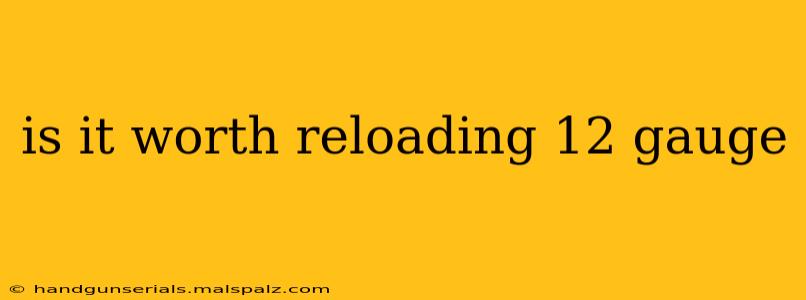Is It Worth Reloading 12 Gauge Shells? A Comprehensive Cost-Benefit Analysis
The question of whether reloading 12 gauge shells is worthwhile is a complex one, depending heavily on individual circumstances and priorities. There's no single "yes" or "no" answer, but a careful consideration of the factors below will help you determine if it's the right choice for you.
The Pros of Reloading 12 Gauge:
-
Cost Savings: This is often the primary driver for reloaders. Factory ammunition prices fluctuate, but reloading can significantly reduce your per-round cost, especially with commonly used components. You can potentially save 30-50% or more, depending on your shooting volume and component costs.
-
Customization: Reloading offers unparalleled customization. You can tailor your ammunition to your specific needs, choosing different shot sizes, powder charges, wads, and primers to optimize performance for various hunting situations or target shooting disciplines. This level of control is impossible with factory loads.
-
Component Availability: While sometimes challenging, finding components for reloading can be easier than finding specific factory ammunition, particularly during periods of high demand.
-
Satisfaction and Skill Development: Many reloaders find the process itself rewarding. It's a hands-on hobby that combines precision with a tangible outcome, and the satisfaction of shooting your own handloaded ammunition is hard to beat.
The Cons of Reloading 12 Gauge:
-
Initial Investment: Getting started requires a significant upfront investment in equipment. You'll need a reloading press, dies, powder measure, scales, and various other tools. This initial cost can be substantial, potentially hundreds or even thousands of dollars depending on the chosen equipment.
-
Time Commitment: Reloading is time-consuming. Each shell requires multiple steps, and producing a large quantity of ammunition will take a considerable amount of time. This is a significant factor to consider if you're short on time.
-
Safety Concerns: Reloading is inherently dangerous if not approached with meticulous care and attention to safety protocols. Improper loading can lead to catastrophic equipment failure or injury. Thorough training and adherence to safety guidelines are absolutely essential.
-
Component Costs Fluctuation: While reloading typically saves money, the prices of components (powder, primers, shot, wads) can fluctuate significantly, sometimes negating the cost savings. Careful monitoring of component prices is essential.
Is it Worth It for YOU? A Decision Framework:
To determine if reloading 12 gauge is worthwhile for you, consider these questions:
-
Shooting Volume: Do you shoot a high volume of 12 gauge ammunition regularly? If not, the initial investment and time commitment might outweigh the cost savings.
-
Budget: Can you afford the initial investment in equipment? Can you consistently find affordable components?
-
Time Availability: Do you have the time to dedicate to reloading?
-
Safety Considerations: Are you willing to invest the time and effort required to learn safe reloading practices and follow them meticulously?
-
Enjoyment Factor: Do you enjoy hands-on hobbies and the satisfaction of creating something yourself?
Conclusion:
Reloading 12 gauge can be a rewarding and cost-effective hobby, but it's not for everyone. Carefully weigh the pros and cons based on your individual circumstances and priorities. If you're a high-volume shooter with the time, budget, and commitment to safety, then reloading might be a worthwhile investment. However, if you're a casual shooter or are uncomfortable with the safety aspects, purchasing factory ammunition might be a more practical and safer option. Remember, safety should always be your top priority when handling firearms and ammunition.

